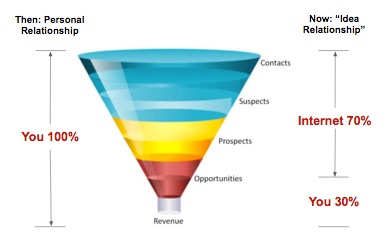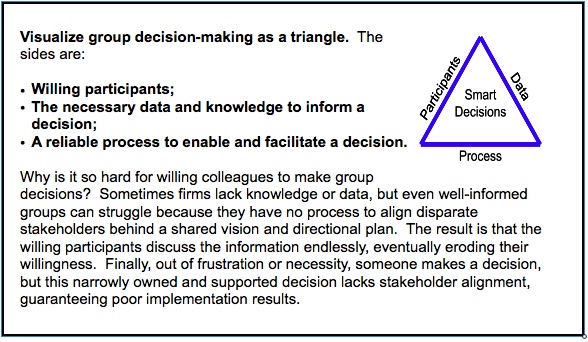
Everyone is familiar with the Law of Unintended Consequences, defined as “outcomes that are not the ones foreseen and intended by a purposeful action.”
In this case, the purposeful action is law firms creating business development training geared specifically for women. The potential unintended consequence is perpetuating the idea that business development is about the seller in any way.
Not too long ago, a consultant friend in this industry asked her peers to recommend “thought leaders to interview about business development training geared toward supporting women.” She acknowledged that “there is always a question of whether men and women should have particularly focused training in this area.” Most of what follows I wrote then, in a private response to her.
The potential unintended consequence is perpetuating the idea that BD is about the seller in any way.
I wish I had published this when I wrote it. In today’s atmosphere, gender topics take on greater sensitivity. Please accept that this is technical/tactical advice, not social commentary.
Foundation principles
Throughout my almost-30 years coaching thousands of lawyers of every description, I’ve found that these principles help lawyers keep things gender-neutral:
-
If you adhere to the outdated "relationship first" approach, you'll rely on social interaction. Men and women socialize differently, which raises the risk of gender-based discomfort.
-
Interactions based on relevance, i.e., business topics that are important professionally to the other party, are inherently gender neutral. If it's not about you, there's less risk of gender sensitivity.
-
If you ask questions instead of making declarations, it's less about you.
-
If your suggestions are phrased as questions, e.g., "Would it be helpful if..." or "How do you think this might work...?" you're unlikely to be perceived as talking down to someone.
-
To enable effective skill development without the need for gender-specific training, first rethink the presumption that a personal relationship is a prerequisite for getting business.
A personal relationship is not a prerequisite for getting business
The longstanding belief about how lawyers get business is, “It’s all about relationships.” Based on that, it’s understandable to perceive that training for women should be different than that for men because women form relationships differently -- not just where they interact, but also the language, tone, and pacing of those interactions.
The critical factor today is “relevance.”
The “relationship first” approach worked during the seller’s market that ended in 2008. In a buyer’s market, it’s outdated. The critical factor today is “relevance.”
Nobody has time for relationship-building
Today, buyers don’t have time to develop relationships with would-be sellers. There are too many aspirants, and most buyers already have a job-and-a-half.
If you doubt this, think about the poster child for all this traditional relationship-building investment.
You know what I mean. You like and respect each other, and enjoy each other’s company. Over time, you’ve done enough of this that it’s grown into a friendship. You have a history of “catching up” lunches. I call this “personal intimacy.”
More frequent cancellations and reschedules
However, more recently, you notice that those lunch invitations are accepted with declining frequency, it takes a lot longer to get on someone’s calendar, and you’re cancelled or rescheduled more often. It’s become much harder for your friend or contact -- even your best client -- to justify diverting time and attention from her job-and-a-half to indulge in lunch with you.
She doesn’t like you or trust you any less. She’s just busier, and thus is obligated to judge her availability by different criteria. While spending time with you is personally enjoyable, a social lunch is an interruption of her day, not an addition to it.
Your friendship isn’t relevant to what she’s required to focus on.
The other rebuttal to the “relationships are everything” claim is simple math. During the seller’s market, everybody was buying, and buying a lot. That meant that buyers had the luxury of buying at least a little from all of their lawyer friends. There was no need for lawyers to invest time generating demand; the demand was already there.
There wasn’t much need to master the process of getting decisions, either. Prospects had already decided to buy; you were merely getting “your share,” however that was defined.
It’s very different today
Now, buyers are shifting a growing percentage of their legal spend away from traditional outside law firms, building up their internal capabilities and making use of non-traditional alternatives such as offshoring, boutiques, professional service firms, and technology solutions.
...studies show that B2B buyers primarily use Internet-based sources to inform themselves
Buyers have more friends than they have outside-counsel budget. No relationship can protect you from that trend, so why invest in bucking it? Your friends might feel bad about not buying from you, or not being able to have lunch, but they have little choice.
Studies show that B2B buyers primarily use Internet-based sources to inform themselves now, and as a result usually have advanced 70% of the way through the traditional sales funnel on their own before being willing to consult with a seller.
themselves now, and as a result usually have advanced 70% of the way through the traditional sales funnel on their own before being willing to consult with a seller.
This is all happening without you, at least in the person-to-person sense.
Professional intimacy
Whether or not people like you or would enjoy spending time with you isn’t germane.
...exposure is now mostly digital, where they consume your thinking and become more familiar and comfortable with it
These new relationships, which I describe as “professional intimacy,” form the same way that traditional friendships form, i.e., cumulatively over time, as a result of frequent exposure. However, the exposure is now mostly digital, where they consume your thinking and become more familiar and comfortable with it, and trusting of it.
They allocate time and attention to your thoughts because you’re relevant, maybe even provocative; you contribute to their ability to deal with the challenges they face every day.
The new relationships are not between individual buyers and you, but between organized groups of buyers (such as an industry) and your ideas.
Knowing how you think
By the time they decide to speak with you directly, or consider you for an assignment, they already know you -- at least, they how you think about the issue in question -- and you’ve already created demand for yourself by contributing value with your thinking.
They don’t know you, the person, but you the relevant contributor.
If you eliminate the assumption that demand is based on a personal relationship, and accept that “idea relationships” are based on people opting into consuming your public content, gender becomes irrelevant.
Gender can be largely irrelevant
When you read a provocative article about a business issue you’re obligated to care about, do you even notice the author’s gender, other than as a passing afterthought that has no bearing on the content’s relevance and usefulness?
Converting interested inquirers into paying clients isn’t about you, either. It’s about your ability to facilitate a good decision, independent of your self-interest, that will survive subsequent scrutiny.
Decision-making among multiple stakeholders is difficult
Few organizations are good at decision-making because most lack a reliable decision process. The seller who facilitates a reliable decision process brings differentiating value to those stakeholders. (Like you do with them after you’re hired.) That usually translates into strong reasons to hire you.

Before you embark on investing in gender-specific BD training, ask yourself, “What is it about establishing and reinforcing a differentiated market position, and facilitating buying decisions, that is gender-specific?”
*
[Mike O’Horo, known by thousands of lawyers as The Coach, is a serial innovator in the law firm business development world. His latest innovation is Dezurve, which has cracked the code on identifying investment-worthy lawyers and eliminating training budget waste.]
comments powered by